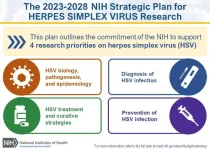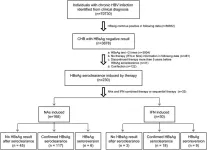(Press-News.org) Researchers at the Tufts Lyme Disease Initiative recently received grants totaling more than $7 million to build on an already impressive array of discoveries that Tufts’ teams have made to combat tick-borne diseases.
While Lyme disease can often be successfully treated with antibiotics, 10-20% of patients experience persistent fatigue, joint pain, and mental impairments that last months or years. For some, it is never clear whether symptoms signal persistent infection, reinfection, or malfunction by the body’s immune system.
Researchers Linden Hu, Peter Gwynne, and colleagues will use grants from the Department of Defense (DoD) and National Institutes of Health (NIH) totaling $4,555,445 to understand the underlying causes of chronic Lyme disease and conduct a large test of a promising screening tool to diagnose Lyme disease sooner, show when people are cured of an initial infection, and diagnose reinfection. Hu is the Paul and Elaine Chervinsky Professor of Immunology and a professor of molecular biology and microbiology at Tufts University School of Medicine. Gwynne is a research assistant professor in molecular biology and microbiology at the School of Medicine.
Along with Samuel Telford III, a professor in the Department of Infectious Disease and Global Health at Cummings School of Veterinary Medicine, Hu and other colleagues also received an $885,000 grant from Tarsus Pharmaceuticals to help develop an oral drug that could be used to kill ticks that are feeding on humans, thereby preventing transmission of Lyme disease.
Klemen Strle, a research assistant professor in molecular biology and microbiology at the School of Medicine, will use a $475,000 grant from the Global Lyme Alliance to study whether abnormally high levels of the immune system component interferon-alpha (IFN-alpha) signals an increased likelihood of developing the long-term effects of Lyme. Elevated IFN-alpha levels are also seen in people with long COVID. This research could lead to new screening tools and treatments for those with persistent Lyme, long COVID, or other diseases with similar symptoms. Anti-IFN-alpha therapies are already used in autoimmune conditions such as lupus.
Tanja Petnicki-Ocwieja, a research assistant professor in molecular biology and microbiology at the School of Medicine, is studying another facet of an altered immune response that may trigger persistent symptoms. Like Strle, her efforts may help scientists better understand both chronic Lyme and long COVID. Petnicki-Ocwieja’s $200,000 grant from the Global Lyme Alliance focuses on innate immune memory, also known as trained immunity, which alerts the immune system to a foreign invader and helps the immune system quickly respond to intruders that it believes could be harmful. The new research will characterize whether and how an innate immune memory malfunction may cause chronic Lyme symptoms. Discoveries could lead to new tests to detect those susceptible to persistent Lyme caused by this mechanism.
Jeff Bourgeois, a postdoctoral scholar in molecular biology and microbiology at the School of Medicine, will use a $210,372 grant from the NIH to study interactions between the Lyme disease bacterium and one of its natural hosts, the Peromyscus leucopus mouse, which does not show symptoms of infection despite remaining infected for life. By better understanding the bacteria's life cycle, he hopes to identify drug targets in rodents that could prevent spread of the bacteria and find ways to make humans respond more like the mice and avoid Lyme disease symptoms altogether.
Edouard Vannier, an assistant professor of medicine at the School of Medicine and in the Division of Geographic Medicine & Infectious Diseases at Tufts Medical Center, and his colleagues have received two grants from the NIH and the DoD totaling $1,048,885 for research to prevent another tick-borne disease, babesiosis. In one study, he and colleagues will test the ability of an anti-malarial drug, tafenoquine, to prevent babesiosis in mice. In limited human testing, tafenoquine has been effective in treating babesiosis. In a second study, they will test whether immunization with one of three potentially promising antigens protects young mice from infection, and whether protection is as strong in older mice. If successful, these studies could lay the groundwork for clinical trials to determine whether one or more of these antigens could prevent human disease.
END
$7 million in new grants propel Tufts Lyme research to next level
Researchers will use new grants to identify better ways to prevent, track, and treat the disease and its long-term consequences
2023-09-19
ELSE PRESS RELEASES FROM THIS DATE:
Leading the way in global STI research
2023-09-19
Researchers in the University of Delaware College of Health Sciences Department of Medical and Molecular Sciences are playing a pivotal role on the global health stage as they investigate the most common sexually transmitted infection (STI) in the world.
Centers for Disease Control statistics show that 79 million Americans have human papillomavirus (HPV). With 14 million new infections each year, 80% of women will get at least one type of HPV at some point in their lifetime, according to the Office on Women’s ...
NIH releases strategic plan for research on herpes simplex virus 1 and 2
2023-09-19
WHAT:
In response to the persistent health challenges of herpes simplex virus 1 (HSV-1) and HSV-2, today the National Institutes of Health released the Strategic Plan for Herpes Simplex Virus Research. An NIH-wide HSV Working Group developed the plan, informed by feedback from more than 100 representatives of the research and advocacy communities and interested public stakeholders. The plan outlines an HSV research framework with four strategic priorities: improving fundamental knowledge of HSV biology, pathogenesis, and epidemiology; accelerating research to improve HSV diagnosis; improving strategies to treat HSV while seeking a curative therapeutic; and, advancing research ...
Early convalescent plasma use — helpful in avoiding severe COVID — also may lower long COVID risk
2023-09-19
Findings from a nationwide, multicenter study led by Johns Hopkins Medicine and the Johns Hopkins Bloomberg School of Public Health suggest that patients with COVID-19 have less chance of developing post-COVID conditions — commonly known as long COVID — if they receive early treatment with plasma from convalescent (recovered) COVID patients that contain antibodies against SARS-CoV-2, the virus that causes COVID-19.
The new research, first posted online today in mBio, a journal from the American Society for Microbiology, is a follow-up investigation to the 2021 clinical trial that showed convalescent plasma ...
Machine learning analysis of research citations highlights importance of federal funding for basic scientific research
2023-09-19
Biomedical research aimed at improving human health is particularly reliant on publicly funded basic science, according to a new analysis boosted by artificial intelligence.
“What we found is that even though research funded by the National Institutes of Health makes up 10% of published scientific literature, those published papers account for about 30% of the substantive research — the important contributions supporting even more new scientific findings — cited by further clinical research ...
Fast-track strain engineering for speedy biomanufacturing
2023-09-19
Using engineered microbes as microscopic factories has given the world steady sources of life-saving drugs, revolutionized the food industry, and allowed us to make sustainable versions of valuable chemicals previously made from petroleum.
But behind each biomanufactured product on the market today is the investment of years of work and many millions of dollars in research and development funding. Berkeley Lab scientists want to help the burgeoning industry reach new heights by accelerating and streamlining the process of engineering microbes to produce important compounds with ...
Firearm violence exposure in Black and American Indian/Alaska Native communities linked to poorer health
2023-09-19
There is a widening health disparity among Black, American Indian and Alaska Native adults exposed to gun violence, according to Rutgers researchers who say these communities have more mental and physical health issues because they witness or are victimized at a higher rate.
In a new study published in Health Affairs Scholar, 3,015 Black and 527 American Indian/Alaska Native (AI/AN) adults residing in the United States were surveyed between April and May 2023.
Participants were asked whether they were threatened with a firearm, shot with a firearm, had a family or friend shot with a firearm, or witnessed or heard about a shooting. The results found that these ...
New evidence indicates vitiligo-associated autoimmunity may contribute to reduced morbidity and mortality risk
2023-09-19
Philadelphia, September 19, 2023 – According to a new study comparing patients with and without vitiligo in South Korea, patients with vitiligo were associated with a 25% decreased risk of mortality compared with controls. This suggests that vitiligo-associated autoimmunity may play a role in reducing morbidity and mortality. The results appear in the Journal of Investigative Dermatology, published by Elsevier.
Previous studies have documented a reduced risk of cancer in patients with vitiligo, however, there has been limited research on the relationship between vitiligo-associated autoimmunity and the risk of morbidity and mortality ...
Eurosceptics more likely to think of the EU as less democratic than it is, study shows
2023-09-19
A significant share of voters see the EU as less democratic than it really is and believe the European Commission can steamroll its member states, a new study shows.
The research shows that key channels of legitimation in the EU are not well known by the citizens of large member states. Whether people see themselves only as citizens of their nation, or simultaneously as a European, is linked to what they believe about the EU.
A substantial share of EU voters who took part in the study believed that the members of the European Parliament are not directly elected. Many assumed the European Parliament is unimportant for decision ...
Poor water, sanitation, and hygiene in low-income countries may help fuel the emergence of deadly pathogens
2023-09-19
A new study suggests that Escherichia coli and other disease-causing microbes are passing easily between humans and animals in Cambodia, a country where clean water, sanitation and hygienic controls are lacking in many regions. The continuous exchange, along with unregulated antibiotic use, leads to the emergence and spread of drug-resistant E. coli, the authors say.
Maya Nadimpalli, a scientific collaborator at the Antibiotic Research Action Center at the George Washington University and her international colleagues, conducted the research in Phnom Penh, an urban area where humans and animals are often living in close proximity without clean water or other ...
Durability of hepatitis b surface antigen seroclearance studied in real-world data from electronic health records
2023-09-19
In a study published in the journal Genes & Diseases, researchers from The Second Affiliated Hospital of Chongqing Medical University analyzed data from an extensive dataset comprising over 70,000 HBsAg-positive individuals at The Second Affiliated Hospital of Chongqing Medical University. They compared two groups: those achieving HBsAg seroclearance through NAs monotherapy (168 patients) and those through IFN monotherapy (30 patients). NAs monotherapy patients were older, with a higher proportion achieving HBsAg seroclearance during ...
LAST 30 PRESS RELEASES:
How much sleep do teens get? Six-seven hours.
Patients regain weight rapidly after stopping weight loss drugs – but still keep off a quarter of weight lost
GLP-1 diabetes drugs linked to reduced risk of addiction and substance-related death
Councils face industry legal threats for campaigns warning against wood burning stoves
GLP-1 medications get at the heart of addiction: study
Global trauma study highlights shared learning as interest in whole blood resurges
Almost a third of Gen Z men agree a wife should obey her husband
Trapping light on thermal photodetectors shatters speed records
New review highlights the future of tubular solid oxide fuel cells for clean energy systems
Pig farm ammonia pollution may indirectly accelerate climate warming, new study finds
Modified biochar helps compost retain nitrogen and build richer soil organic matter
First gene regulation clinical trials for epilepsy show promising results
Life-changing drug identified for children with rare epilepsy
Husker researchers collaborate to explore fear of spiders
Mayo Clinic researchers discover hidden brain map that may improve epilepsy care
NYCST announces Round 2 Awards for space technology projects
How the Dobbs decision and abortion restrictions changed where medical students apply to residency programs
Microwave frying can help lower oil content for healthier French fries
In MS, wearable sensors may help identify people at risk of worsening disability
Study: Football associated with nearly one in five brain injuries in youth sports
Machine-learning immune-system analysis study may hold clues to personalized medicine
A promising potential therapeutic strategy for Rett syndrome
How time changes impact public sentiment in the U.S.
Analysis of charred food in pot reveals that prehistoric Europeans had surprisingly complex cuisines
As a whole, LGB+ workers in the NHS do not experience pay gaps compared to their heterosexual colleagues
How cocaine rewires the brain to drive relapse
Mosquito monitoring through sound - implications for AI species recognition
UCLA researchers engineer CAR-T cells to target hard-to-treat solid tumors
New study reveals asynchronous land–ocean responses to ancient ocean anoxia
Ctenophore research points to earlier origins of brain-like structures
[Press-News.org] $7 million in new grants propel Tufts Lyme research to next levelResearchers will use new grants to identify better ways to prevent, track, and treat the disease and its long-term consequences




